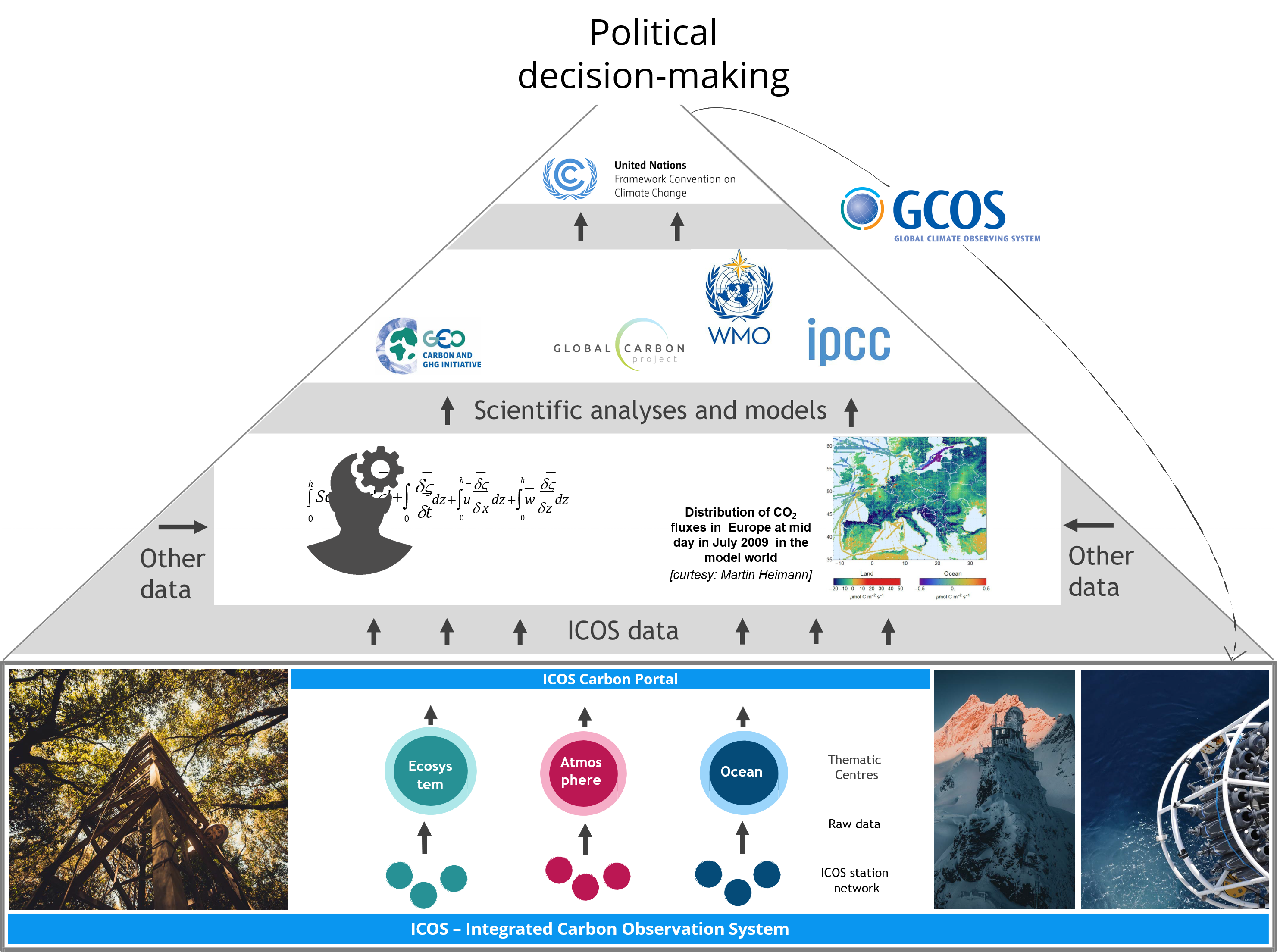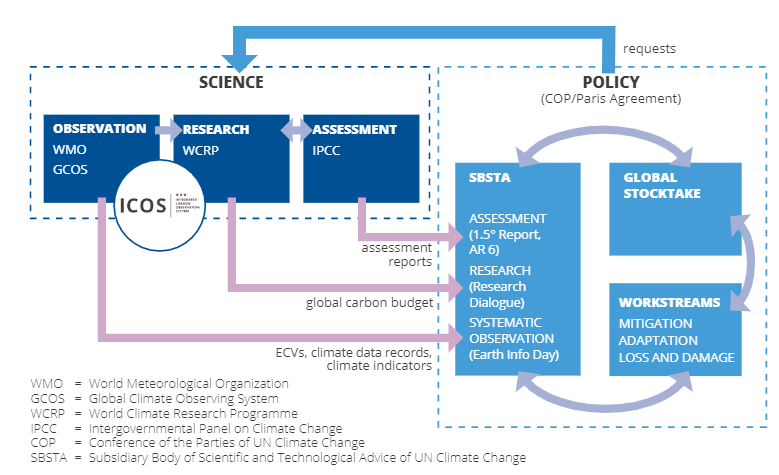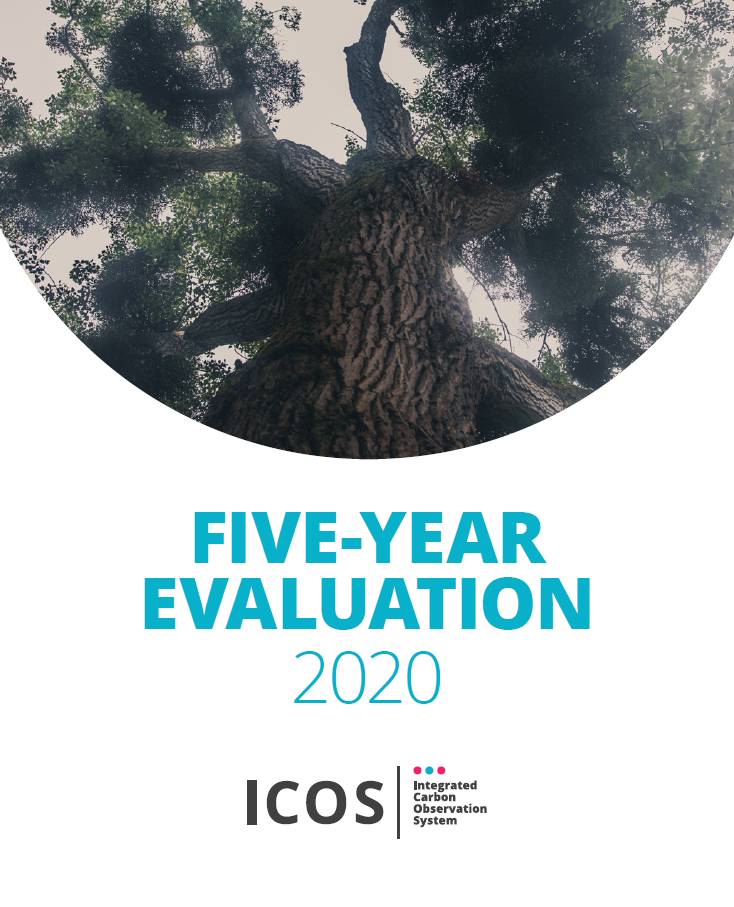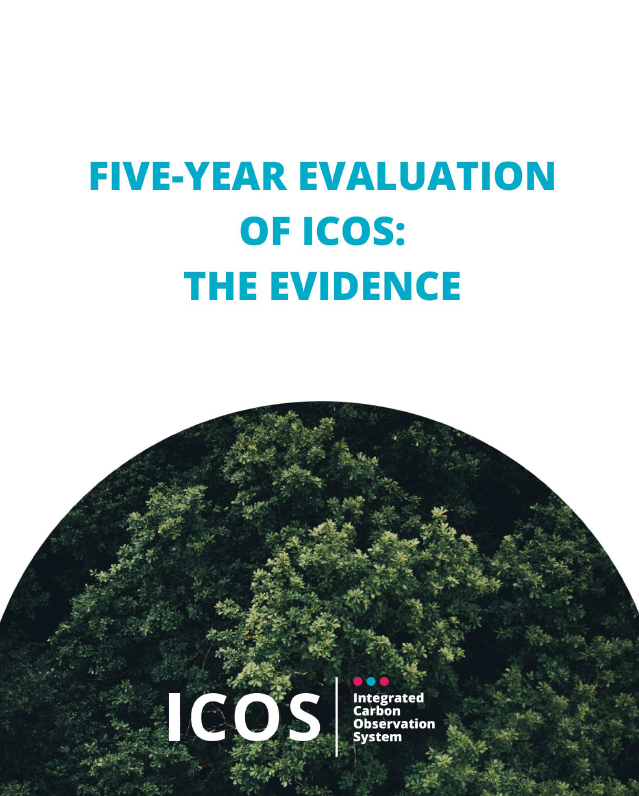
The International Conference on Research Infrastructures (ICRI) brings together policy experts, facility managers, leading researchers and a variety of other stakeholders to discuss challenges and emerging trends for research infrastructures around the world.
The Integrated Carbon Observation System (ICOS) is the European pillar of a global system that monitors greenhouse gas concentrations and exchanges between atmosphere, land and oceans. ICOS provides open and standardized long-time series of high-precision data that are crucial to study the Earth’s climate.
The societal impact of research infrastructures like ICOS goes far beyond the production of excellent science. The knowledge generated on the basis of ICOS data is highly relevant to help policy-makers make informed decisions. It supports the UN Sustainable Development Goals and the creation of a global Monitoring and Verification Support (MVS) capacity to serve the Paris Agreement. The integration of ICOS data into the major global datasets is essential to advance FAIR principles internationally.
ICOS cooperates with its major counterparts in other regions of the world to form a global response to the threat of climate change.
Societal Impact
ICOS and its fellow Research Infrastructures set the grounds for excellent scientific research. But their impact goes beyond science or economic benefits. Learn more about how Research Infrastructures foster innovation and support policy-makers in their decisions.
ICOS provides high-precision, long-term measurements of greenhouse gases (CO2, CH4, NO2, etc.) from 146 sites across 13 European countries. These measurement sites can be broadly categorised within the three domains: ecosystem, atmosphere and oceans. ICOS data in all the domains have stringent and uniform quality checks (QC); uniform QCs across the different sites in a given domain ensures that the data is extremely accurate and reliable. In situ measurements from ICOS enable accurate monitoring and verification of satellite data and model outputs. Despite the advancement in technology, remotely sensed data as well as numerically modelled data need to be verified with respect to the ‘truth’ which is what observations like ICOS data provide. Thus ICOS is a partner in European projects such as VERIFY and CoCO2 where we work closely with other key players like ECMWF, Max Planck and TNO. In the present climate scenario with rising concentrations of atmospheric greenhouse gases, long-term data records from ICOS will prove to be a crucial benchmark on the European scale.
The impact of the observational data collected by ICOS can be seen at different levels. The scientific impact is clearly measured by the large number of high-level scientific articles published by researchers in the ICOS community and by the numerous users of the ICOS data. This necessary step towards the creation of new knowledge is reflected e.g., in the IPCC Assessment Reports where many traces of ICOS can be found. ICOS supports the development of elaborated products by the connected scientific communities that depend partly or completely on ICOS data. The Carbon Portal provides resources to integrate and disseminate elaborated data products created by the research community for example in collaborative projects. Examples of ICOS elaborated data products are the STILT Footprint Tool, which is an online tool to analyse the potential impact of natural and human-caused emissions on the atmospheric composition at all ICOS and free to choose locations and Forecast of air mass backtrajectories at ICOS stations , all based on ECMWF weather model data.
In addition to providing free greenhouse gas data at the Carbon Portal, ICOS offers services for visualisation, analysis and management of data, as well as support for co-operation in a Virtual Research Environment (VRE). Jupyter is a VRE incorporating a collection of tools for interactive computing and sharing of computational ideas. In ICOS, Jupyter serves as a collaboration platform between researchers and scientists working with ICOS data sets and as information platform for policy makers and the public. In addition, Jupyter functions as an educational platform for explaining complex climate-related environmental processes based on ICOS data sets.
ICOS also makes significant efforts to make scientific knowledge available for decision-makers. By strongly engaging internationally and being active at the science/policy interface, ICOS aims at supporting the transformation of its data, products and services into evidence-based climate policies with a societal impact. Through cooperative projects, ICOS also supports the development of GHG observations in under-researched regions of the world, such as Africa.

Paris Agreement
The Paris Agreement calls for a transparent monitoring, reporting and verification system for national greenhouse gas emissions. In Europe, ICOS is a key element of the development of the so-called Monitoring and Verification Support (MVS) capacity, under the lead of Copernicus. Learn more about the current and future developments.
In 2015, the Paris Agreement opened a new era in the global efforts to address the threat of climate change. By putting the best available science at the core of the process, the Paris Agreement has put pressure on those delivering climate science and, in turn, on those providing the data on greenhouse gas emissions serving as a base for the production of scientific knowledge. The European Union has been an active part in reaching the agreement and has set up an ambitious objective that was reaffirmed in April 2021 with the new European Climate Law.
Europe has also strongly engaged in the establishment of a continental Monitoring and Verification Support capacity to help its member countries meet the requirements of the Paris Agreement. Spearheaded by the European Copernicus program, the development of a prototype for an operational MVS capacity for anthropogenic emissions is currently under way in the CoCO2 project. CoCO2 aims at becoming one of Copernicus services and at integrating all existing data and modelling outcomes to provide reliable estimates on GHG emissions and their trends. ICOS is the partner providing the ground-based (in situ) observations for the system. The improvements achieved with an operational MVS capacity will allow countries to better inform the Global Stocktake of the Paris Agreement which is the basis for the so-called ambition mechanism that must ensure the success of the agreement.

International Cooperation
Global challenges require global efforts. ICOS takes an active part in international data initiatives and cooperates with similar Research Infrastructures around the world. Learn more about the international cooperation activities of ICOS.
Distributed research infrastructures are by essence examples of international cooperative efforts. Thus, it comes as no surprise that international cooperation is one of the key focus areas in the strategy of ICOS. The activities are mainly covering three domains:
- the expansion of the ICOS network in Europe is a prerequisite to increase the scientific relevance of the GHG measurements. Covering the various biomes in Europe, monitoring emissions at a wide range of latitudes, observing atmospheric transport of the main air masses coming in and out of Europe are crucial elements to provide data of high added-value for researchers, modelers and other data users, ICOS ERIC has currently 13 member countries and Hungary will join in January 2022. Intense discussions are under way in order to expand the ICOS network towards the central and eastern parts of Europe (Poland, Greece, etc.) as well as to better cover marine and oceanic regions (Portugal, Ireland, etc.).
- the collaboration between environmental research infrastructures in Europe has been a long-standing effort for ICOS. As the coordinator of one of the major cluster projects, ENVRI-PLUS, ICOS has developed deep cooperation activities with its counterparts in the ENVRI Community. As a multi-domain RI covering atmosphere, ecosystems and oceans, ICOS has a large potential contact area for collaboration with other RIs. This can take the form of co-located monitoring stations, common work on measurement protocols, implementation of the FAIR principles for the data generated.
- ICOS has established itself as the European pillar for GHG measurement but it also develops strong links to similar infrastructures in other parts of the world. A Memorandum of Understanding was signed in December 2020 establishing the Global Ecological Research Infrastructure (GERI) with partners from Australia, China, Europe, South Africa and the United States. Currently, an initiative to better coordinate the global observation of the surface ocean carbon is being implemented with the main actors of the domain (GOOS, IOCCP, EMODnet, etc.). ICOS also develops collaborative activities to integrate its data into the main global initiatives, like the Global Atmosphere Watch (GAW) of the World Meteorological Organization (WMO), FluxNet, the Surface Ocean Carbon Atlas (SOCAT) in order to provide scientists with easy access to frequently updated and global datasets of high-quality.
The main objectives of international cooperation are to seek for synergies and maximise the impacts of the activities performed by the research infrastructure. For this purpose, ICOS has also joined the major global cooperation frameworks as an intergovernmental observer organisation. This is for instance the case in the UN Framework Convention on Climate Change (UNFCCC), the Intergovernmental Panel on Climate Change (IPCC) and the Group on Earth Observations (GEO). ICOS engages there with decision-makers to provide them with the necessary information to design evidence-based climate policies.
Research Infrastructure Evaluation
The ICOS Statutes state an evaluation should be carried out every five years, and the ICOS governing body, General Assembly, instructed one in 2020. The GA established an Evaluation Committee with five experts in the fields of oceans, ecosystems, atmosphere and finances.
This evaluation looked into Management, Finances, Internal Engagement, ICOS Data, and International Cooperation. The Head Office staff created a comprehensive Evidence report that consisted of descriptions of the themes involved, based on survey results and lists of relevant documents. Several groups of users and stakeholders connected to ICOS RI were surveyed and the results are used in developing the whole organisation.
The journey of evaluating a distributed Research Infrastructure for the first time was a challenging task. There were no guidelines to follow, but completing the task was very rewarding for everyone involved. ICOS ERIC cooperated with the Evaluation Committee in developing the method on the go and were able to accomplish a satisfying process and method to follow in the future evaluations.
A set of Key Performance Indicators or KPIs were created – some to be used only once in this evaluation, since they are relevant only to the implementation phase of ICOS, and some to be followed up every year or every five years. The evaluation categories, the status of the KPIs, and the survey results were presented in the final meeting with the Evaluation Committee. Relevant groups from the ICOS RI and stakeholders were invited to follow and discuss the results. The Evaluation Committee presented their recommendations to the GA. The ICOS RI community have analysed the evaluation report and have created a detailed plan to implement the recommendations. The committee recommendations will be implemented during 2021.
The Evaluation report has also a complementary ‘Evidence Report’ compiled by ICOS ERIC, providing further insight and details in the areas evaluated. Read the Evidence Report.

